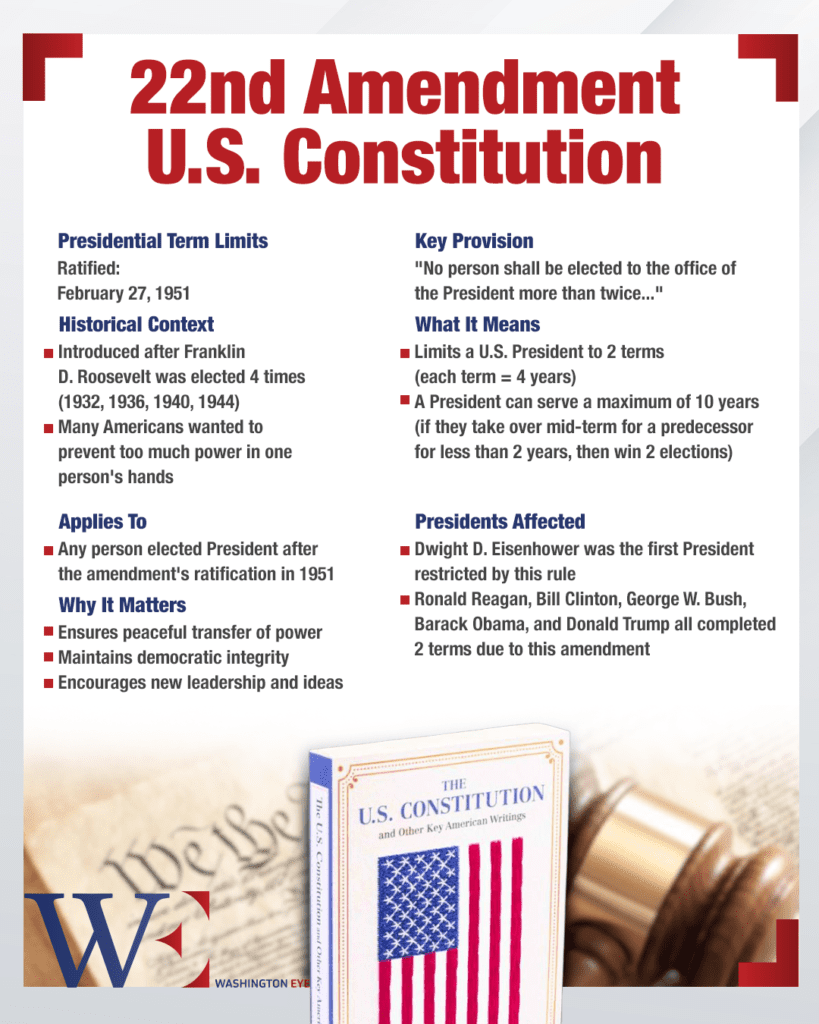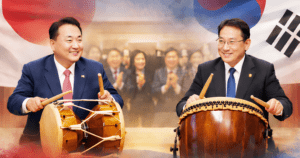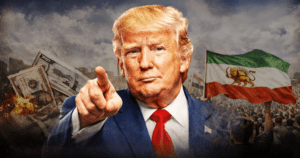In a move that has sent shockwaves through the political landscape, President Donald Trump has declined to confirm whether he will step down after his second term, fueling speculation about a potential bid for a third term—a direct challenge to the 22nd Amendment of the U.S. Constitution. This unprecedented ambiguity has elicited strong reactions from both sides of the political aisle, raising concerns about the future of American democracy.
The 22nd Amendment, ratified in 1951, was designed to prevent any individual from holding the presidency for more than two terms, a safeguard against the consolidation of power reminiscent of monarchical rule. President Trump’s reluctance to commit to this constitutional mandate not only undermines this foundational principle but also sets a perilous precedent for the erosion of democratic norms.
Historically, the peaceful transition of power has been a hallmark of the American political system, distinguishing it from autocratic regimes. By casting doubt on his adherence to this tradition, President Trump risks destabilizing the very fabric of the nation’s governance and eroding public trust in its institutions.
Compounding these concerns are the administration’s recent policy decisions that have further polarized the nation. The announcement of new reciprocal tariffs on nearly all U.S. trading partners has ignited fears of an impending recession, with Wall Street reacting negatively to the prospect of escalating trade wars. Such economic turbulence threatens to undermine the financial well-being of American citizens and diminish the country’s standing in the global market.
Moreover, the administration’s handling of sensitive information has come under scrutiny. The accidental inclusion of a journalist in a Signal group chat containing military attack plans has raised serious questions about the competence and security protocols within the highest levels of government. This breach not only compromises national security but also reflects a troubling lack of oversight and accountability.
In the realm of justice, the Department of Justice’s decision to drop a lawsuit challenging Georgia’s election law—a law criticized for its potential to suppress Black voter turnout—signals a retreat from the commitment to safeguarding voting rights. This move undermines decades of progress toward electoral inclusivity and equality, casting a shadow over the integrity of the democratic process.
Internationally, the administration’s imposition of sanctions on Iranian oil connections and the contemplation of military force to acquire territories like the Panama Canal and Greenland have heightened geopolitical tensions. Such aggressive posturing not only isolates the United States on the world stage but also risks entangling the nation in conflicts that could have far-reaching and unforeseen consequences.
Domestically, the dismissal of top military officials, including the chairman of the Joint Chiefs of Staff and the Chief of Naval Operations, has raised alarms about the politicization of the armed forces. The integrity and apolitical nature of the military are vital to national stability; undermining this tradition threatens the foundational balance of civil-military relations.
Furthermore, the administration’s approach to immigration enforcement, exemplified by the deportation of alleged gang members to El Salvador without due process, has drawn criticism from human rights advocates. Such actions not only violate international human rights standards but also erode the moral authority of the United States in advocating for justice and due process globally.
The cumulative effect of these developments paints a concerning picture of a presidency that appears increasingly willing to challenge constitutional boundaries, disrupt economic stability, and forsake long-standing democratic norms. As the nation stands at this critical juncture, it is imperative for both elected officials and citizens to reaffirm their commitment to the principles enshrined in the Constitution. Vigilance, active engagement, and a steadfast dedication to democratic values are essential to navigate these turbulent times and ensure that the United States remains a beacon of democracy and justice.
President Trump’s recent actions and statements represent a pivotal moment in American history. The ambiguity surrounding his intentions post-second term, coupled with a series of contentious policy decisions, necessitates a robust and unified response from all who cherish the democratic ideals upon which the nation was founded. The preservation of these ideals requires unwavering commitment and collective action to uphold the Constitution and the rule of law.
















